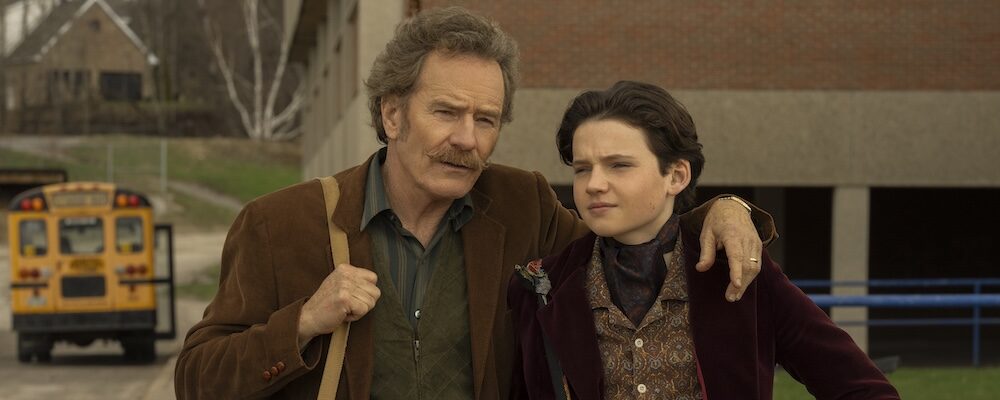‘Everything’s Going to Be Great’: Bryan Cranston and Allison Janney Chase Theater Dreams To Realistic Closure
Tony Sokol
Young theater people are among the most enthusiastic artists, especially as they get older. Director Jon S. Baird gracefully curbs this optimism in “Everything’s Going to Be Great,” by imposing reality on seemingly impossible dreams. Allison Janney and Bryan Cranston play Macy and Buddy Smart, a theatrical couple tilting at windmills with Quixotic abandon until the right opportunity comes just within reach.
“Everything’s Going to Be Great” is an intimate film about a community theater manager who puts on increasingly intimate performances when the first rule of the stage is filling seats. The film begins in 1989 in a small town in Ohio. Buddy is offered a seasonal producing job at a respected theater in New Jersey, which could lead to longer-term work there and at a larger Milwaukee venue. It is a gamble, contingent on attendance.
The film touches on passing the torch of a family vocation, but works best as a coming-of-age story for 14-year-old Lester Smart (Benjamin Evan Ainsworth) and his 16-year-old brother, Derrick (Jack Champion). The acting bug has infected one, the other is fine with a job at Foot Locker and a spot on the school football team. Families may be plagued by greater divides, but show business is less forgiving. It is about reaching capacity.
Janney and Cranston are two of the most versatile actors working, bouncing between comedy and drama for the fun of it. This is evident here. Pairing for the first time, their scenes together bristle with tension or tenderness, hope or fear, without ever breaking the family bond. Marital vows, on the other hand, become problematic, throwing ambiguity into the mix and bubbling resentment which must remain veiled. “It’s hard being the plus one in your own life sometimes,” an alienated and sidelined Macy confides. Cranston’s performance also benefits from unspoken motivations and interior doubts with roots that remain unknown until a late reveal.
Janney and Cranston deliver extremely believable performances through eccentric subtleties. Cranston sells Buddy’s ideals with irresistible commitment and real joy. He dreams, schemes, and seems to know what it means to reinvigorate regional theater. Buddy’s love of family fuels his passion for the stage while blowing smoke up his own ass. Janney’s Macy is burdened with a bookkeeper’s vision of financial balance sheets. She is beginning to see Buddy’s bottomless well of optimism as being a few buckets short of realistic sustainability. “Dreams can destroy you,” Macy later warns Lester. An unresolved and ungainly religious gap under the surface of the marriage exerts dual conflict as the youngest son appears headed in his father’s atheistic direction.
Ainsworth instills a gleefully provocative unpredictability into Lester, and not just because the character may break into song without notice, or sport an ascot to the P.E. class he is failing. Righteous anger comes naturally to dramatic young performers, but Ainsworth covers the bitterness of betrayal in plain sight for only those looking for excuses. Lester’s innocence is as good for laughs as lessons, from the very opening sequence. Forced to audition in family-run productions, he steals scenes in smaller roles by stage-bombing grand moments. Yet, Lester’s rapt response to the church-choir solo from Selena Roach (Jessica Clement), a local friend waiting to escape to L.A, provides the greatest threat to individual expression, and the impetus to push the budding actor to pursue New York City dreams.
Champion should have been given more screen time. Derek’s arc is no less complicated than Lester’s. He can’t maintain relationships or friendships because he is constantly forced to move, and made to perform the most humiliating parts in the corniest musicals. The family misfit for wanting a normal life playing football and losing his virginity, Derek openly admits being embarrassed by theatrical homelife. Yet, he can’t help providing harmonies or scatting horn parts during car-ride singalongs.
Steven Rogers’ screenplay is peppered with witty rejoinders, snappy retorts, and an unabashed appreciation for the timelessness of stagecraft. This is most enjoyable in Lester’s unexpected fantasy conversations with long-dead stage luminaries like Ruth Gordon (Chick Reid), Noël Coward (Mark Caven) and Tallulah Bankhead (Laura Benanti). When circumstances force the Smarts to move to a Kansas farm owned by Macy’s brother, Walter (Chris Cooper), Lester is assured by the playwright William Inge (David MacLean): “Kansas turned me into a real artist. You can be happy here.” The youngest Smart finds this less comforting after remembering to ask: “Didn’t you kill yourself?”
Much of the humor, and any semblance of endearing eccentricity, fades after the first half. Reality erodes the fantasy life of the long-running theatrical family. Buddy’s denial is infectious, an early scheme to grab an audience is audacious, but optimism is not its own reward. “Everything’s Going To Be Great” excels in the frustrations of the grandest of short-sighted dreams. A bittersweet payoff drags proceedings to a necessary lull, before concluding the show must go on.
“Everything’s Going to Be Great” releases June 20 in select theaters.

